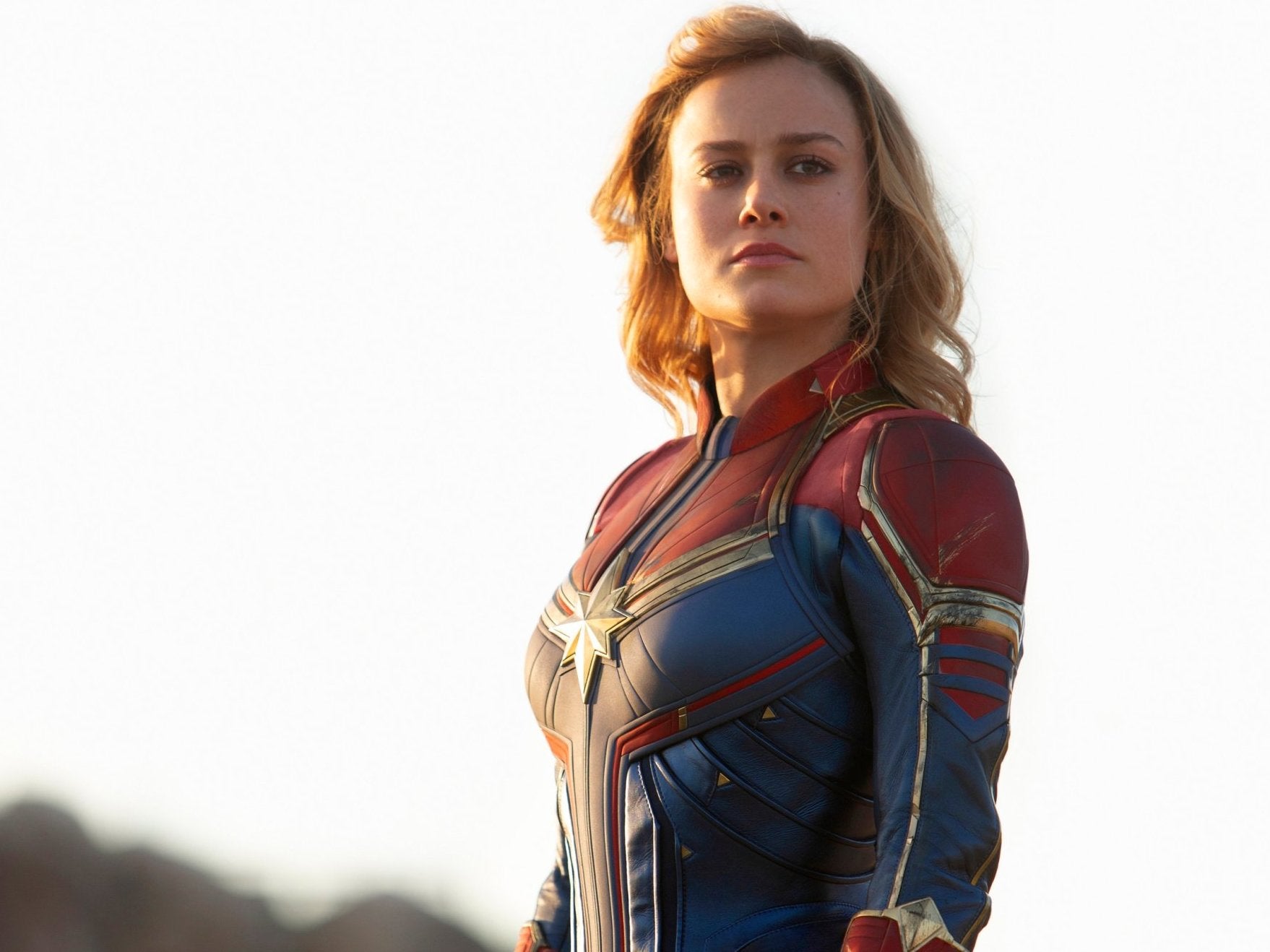Captain Marvel delivers a perfect answer to her trolls
Marvel’s latest outing is a reminder that those who will never accept you for who you are simply aren’t worth your time, writes Clarisse Loughrey


*Warning: Contains spoilers for Captain Marvel*
The “Perpetually Angry Men of the Internet” work with an amusing predictability. You can see them turn red from a mile off. When Sony announced that their reboot of Ghostbusters would see an all-female team don those iconic jumpsuits, they raged. When Mad Max: Fury Road’s Furiosa dared to step centre stage in a film with a man’s name in the title, they raged. When Rey didn’t play damsel in distress for them in Star Wars: Force Awakens, they raged. When Gal Gadot didn’t fit their preconceived image of Wonder Woman’s “bombshell” body type, what did they do? They raged.
These are piranhas swimming in the Amazonian waters, in search of the mere scent of blood in order to trigger their frenzy. The flimsiest of excuses will do. When it came to Captain Marvel, the latest of Marvel’s superheroes to reach the big screen, it was a few stern looks from its lead Brie Larson in the trailer (“Why isn’t she smiling?” they cried), followed up by an innocuous statement from the actor pushing for a greater diversity of journalists on her press tour (“She hates white men!” they assumed). It makes little difference what they’re mad about. They’re just mad. Hollywood’s female-fronted franchises rarely get to simply exist, succeeding and failing by their own merit. Instead, an inevitable backlash to their very existence will be sparked, met by a wave of defence from the other side. The argument will heat up and, suddenly, it feels like the film now has to justify the very existence of womankind itself. It’s an exhausting process every time it happens.
Yet, an oddly comforting facet of Captain Marvel is that the film, directed by indie duo Anna Boden and Ryan Fleck, already has a response to this latest biliousness up its sleeve. The film’s most crucial emotional moment – in a narrative filled with intergalactic clashes and shapeshifting foes – sees our Captain, otherwise known as Carol Danvers, face the man who, for so long, has trained her to suppress her powers and declare: “I have nothing to prove to you.” Why would she strive to gain respect from those who view her strength merely as a threat? And why should female-fronted films pander to those actively cheering their failure? There’s no need. Captain Marvel is sailing comfortably towards a predicted $350m-plus global opening at the box office, not far from what the megahit Black Panther earned during its first weekend.
If the scene’s underlying meaning wasn’t quite clear enough, Carol’s line is preceded by the image of said man – moments after she’s demonstrated her ability to punch through spaceships – demanding that she put aside her celestial powers and take him on in a round of fisticuffs. It stinks of the same kind of desperate entitlement as when conservative commentator Ben Shapiro tried to offer Alexandria Ocasio-Cortez $10,000 to debate with him. Or the kind of entitlement the “Perpetually Angry Men of the Internet” show in their harassment of women, demanding endless justification and proof of qualification before a woman is ever allowed to have an opinion. Their entitlement is an expectation that the game will always be played on their time, according to their rules. Carol’s hero moment is when she realises she has better things to do with her time.
Though Captain Marvel doesn’t step particularly far from the Marvel template, there’s something to be said about its choice to disregard the linear narrative of a traditional origin story. We open at a point in time when Carol has already gained her powers, left Earth, and become part of Starforce, an elite military team belonging to the Kree race of aliens. This isn’t a film about a hero stumbling into newfound power and learning to master it, it’s about a hero who already possesses that control. Her struggle is the realisation that those around her have placed limitations on what she can achieve and the measures it takes to release herself from those limitations. It’s a tidy metaphor for more ordinary struggles. Even in Carol’s pre-superpowered days, she’s always told her ambitions are off-limits. Her failures are treated like proof she’s unfit. When she falls from the rope during a training exercise at Air Force academy, a male colleague snorts: “You know why they call it a cockpit, don’t you?” She’s similarly dismissed on Earth as a “decent pilot but too emotional”, an idea later echoed during her intergalactic years by her Starforce superior Yon-Rogg (Jude Law) – even in space, age-old sexist notions seem alive and well. Never mind the fact that Yon-Rogg’s insistence that Carol control her powers happens to coincide with each moment she comes close to displaying their full potential.

Captain Marvel, then, is a story of self-reclamation. She discards her old Kree name, Vers, and rebaptises herself as Carol. She changes the colours of her superhero suit to better redefine herself. Even the film’s 1990s setting lends itself well to the film’s themes. Its soundtrack is filled with the kind of proud, unapologetic women that defined the era’s music, from No Doubt’s Gwen Stefani to TLC. Her catchphrase of “Higher, Further, Faster” is said less in direct competition with anyone else, but more with the old image of her that was shaped by the men around her. She becomes free to be the very best that can be. That just happens to be the proton-blasting force that Marvel fans are hoping will be enough to defeat Thanos in next month’s Avengers: Endgame.
Carol’s journey isn’t unprecedented in the Marvel universe. There are echoes of her story in both 2017’s Thor: Ragnarok and 2018’s Black Panther, where its heroes both shed what’s expected of them in order to fulfil their potential. Thor (Chris Hemsworth) frees himself of the burden of his father Odin’s legacy and the crutch that was his hammer Mjölnir, embracing his duty as the leader of Asgard and his full set of powers as the God of Thunder – cue the film’s lightning-blazing, Led Zeppelin-accompanied pièce de résistance. Black Panther’s T’Challa (Chadwick Boseman), too, undergoes a personal transformation after he disputes the teachings of his ancestors, choosing instead to open Wakanda’s doors to the world.
At a time when all of us, young people especially, are constantly barraged with negative messages that seek to limit or drag us down – from the internet, media, or even those around us – perhaps it’s fitting for Marvel to reframe its idea of heroism in this way, where the journey is not a path of chosen destiny, but a search for personal freedom. It’s the courage to accept what can’t be changed or is out of our control, but to instead find the power that lies within our own selves. Captain Marvel views this from a distinctively feminine perspective. Carol knows there are those who will never accept her for who she is – whether they be online trolls or Kree military officers – but, as she learns, those aren’t the kind of people she should let herself be defined by.
Captain Marvel is out in cinemas now
Join our commenting forum
Join thought-provoking conversations, follow other Independent readers and see their replies
Comments
Bookmark popover
Removed from bookmarks